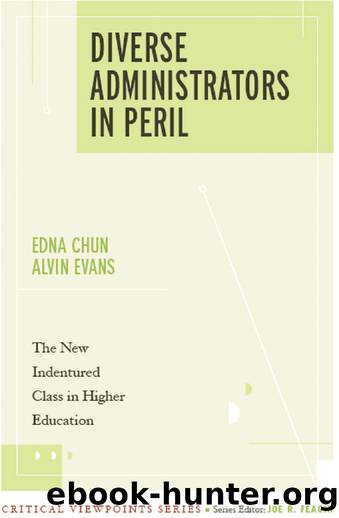Diverse Administrators in Peril by Chun Edna;Evans Alvin;

Author:Chun, Edna;Evans, Alvin;
Language: eng
Format: epub
Publisher: Taylor & Francis Group
Published: 2012-08-15T00:00:00+00:00
And Megin, the white female administrator cited earlier, notes the informal types of exclusion from opportunities to comment or participate in decision-making meetings, despite her expertise in certain subject areas. She observes, âI think it is a matter of informal ⦠itâs all informalâ¦. Itâs meetings, and inviting people to comment, and not inviting others to comment, itâs not even getting to the meeting, not even getting to the table, itâs all those things I have experienced. Even though I may be an expert in a particular topic, I am excluded from the discussion, because I feel like, you know, I am a femaleâ¦.â
As we shall see in this chapter, the formal and frequently opaque mechanisms of hiring, performance evaluation, compensation, promotion, and disciplinary sanctions can offer the opportunity for subjectivity and particularistic treatment. Research findings indicate that discrimination tends not to occur when actions would be recognized as motivated by racial bias, but occurs when behavior can be justified by other factors (Dovidio, Gaertner, Kawakami, and Hodson, 2002; Saucier and Miller, 2003). As a result, gatekeeping actors can readily adapt or develop subtle and nuanced rationalizations for acts of social closure. The process of eroding an administratorâs credibility may begin with subtle attacks that cast doubt on the individualâs professionalism, conduct, competency, or work ethic. In particular, the potential for subjectivity increases when soft skills such as interactional skills of teamwork, ability to fit in, and collaboration serve as justification for employment actions (Moss and Tilly, 1996). The accumulation of incursions upon the employment record through performance evaluation and related organizational processes can tarnish the administratorâs reputation and provide ammunition for later, more severe employment outcomes.
In a salient example, Michael, a black Affirmative Action administrator, describes how his new white male supervisor did not value his experience and dismissed his expertise, despite his documented record of long and exemplary service at the university. Feeling that he was measured by a different standard, he underwent significant stress, noting that âin every decision, every transaction I had to perform better, be better.â Similarly, the testimony of middle-class black Americans in a ground-breaking study involving 209 interviews with African Americans underscores the reality that no amount of achievement or hard work, or even money, resources, or success can protect black individuals from the persistent incursions of white racism in their everyday lives (Feagin and Sikes, 1994).
The lack of support from Michaelâs new supervisor eventually led to Michaelâs retirement from the university. The separate but unequal gauntlet of administrative hurdles faced by this employee led to the loss of a talented and dedicated member of the university community who was responsible for safeguarding equal opportunity.
As a corollary to this avenue of inquiry, in this chapter we shall also explore the impact of the process of collusion upon organizational outcomes, both from the perspective of targeted individuals as well as bystanders from disadvantaged groups. When stigmatized groups engage in forms of self-oppression and denial of the existence of systemic discrimination, this defense of the system keeps the patriarchal, sexist, and heterosexist frame in play.
Download
This site does not store any files on its server. We only index and link to content provided by other sites. Please contact the content providers to delete copyright contents if any and email us, we'll remove relevant links or contents immediately.
| Administration | Adult & Continuing Education |
| Business School Guides | College Guides |
| Financial Aid | Graduate School Guides |
| Law School Guides | Medical School Guides |
| Test Preparation | Vocational |
Navigation and Map Reading by K Andrew(4888)
Spare by Prince Harry The Duke of Sussex(4786)
Tuesdays with Morrie by Mitch Albom(4400)
Cracking the GRE Premium Edition with 6 Practice Tests, 2015 (Graduate School Test Preparation) by Princeton Review(4043)
Machine Learning at Scale with H2O by Gregory Keys | David Whiting(3618)
What It Really Takes to Get Into Ivy League and Other Highly Selective Colleges by Hughes Chuck(3551)
Never by Ken Follett(3523)
Goodbye Paradise(3446)
Harry Potter and the Prisoner of Azkaban (Book 3) by J. K. Rowling(3109)
Pledged by Alexandra Robbins(3047)
Kick Ass in College: Highest Rated "How to Study in College" Book | 77 Ninja Study Skills Tips and Career Strategies | Motivational for College Students: A Guerrilla Guide to College Success by Fox Gunnar(2998)
Fairy Tale by Stephen King(2946)
A Dictionary of Sociology by Unknown(2852)
Sapiens and Homo Deus by Yuval Noah Harari(2843)
The Social Psychology of Inequality by Unknown(2763)
Reminders of Him: A Novel by Colleen Hoover(2753)
Graduate Admissions Essays, Fourth Edition: Write Your Way into the Graduate School of Your Choice (Graduate Admissions Essays: Write Your Way Into the) by Asher Donald(2735)
Get into Any College by Tanabe Gen Tanabe Kelly(2630)
Zero to Make by David Lang(2627)
